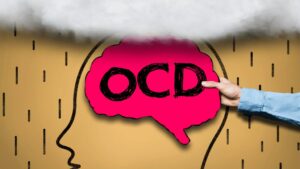Obsessive-compulsive disorder (OCD) is a mental health condition that affects approximately 2% of the population. It’s well known for its intrusive and persistent thoughts, which can be very distressing and interfere with everyday life. People of all ages can experience OCD, but it’s particularly common in adults. While there is no “one-size-fits-all” solution for treatment, there are several evidence-based methods that have been proven to help those living with OCD manage their symptoms. In this blog post, we look at some of the most effective OCD treatments for adults and how they can aid in overcoming the disorder.
Contents
What is OCD?

Obsessive-compulsive disorder, or OCD, is a mental health condition that affects people of all ages. Symptoms of OCD can include intrusive thoughts, compulsions ( repetitive behaviors), and anxiety. People with OCD often feel like they can’t control their thoughts or actions.
The reasons for OCD are not clear and no one knows exactly what causes it, but it’s believed to be a complex mix of environmental, biological, and psychological factors.
OCD is a type of anxiety disorder. Anxiety disorders are the most common mental health condition in the United States. OCD is treatable, but it can be a lifelong condition. Treatment for OCD often includes medication and therapy.
OCD Treatment For Adults
OCD treatment for adults typically includes a combination of medication and therapy. Medication can help to reduce the obsessions and compulsions associated with OCD, while therapy can help to change the thinking patterns that contribute to the disorder.
Medications for OCD
There are a number of medications that can be effective in treating OCD, but they don’t work for everyone. The most commonly prescribed medications for OCD are antidepressants, which are also used to treat other conditions such as anxiety and depression.
Selective serotonin reuptake inhibitors (SSRIs) are the most commonly prescribed type of antidepressant for OCD. SSRIs work by increasing levels of serotonin, a neurotransmitter that helps regulate mood and is thought to be involved in obsessive thoughts and compulsive behaviors. Examples of SSRIs include fluoxetine (Prozac), paroxetine (Paxil), and sertraline (Zoloft).
Clomipramine (Anafranil) is another type of antidepressant that is sometimes used to treat OCD. Clomipramine works differently from SSRIs but has similar side effects.
Other medications that have been used to treat OCD include antipsychotics, beta-blockers, and anti-anxiety medications. However, these other medications are not as well studied as antidepressants and their effectiveness in treating OCD is not as clear.
Therapy for OCD
There are many different types of therapy that can be effective for treating OCD. The most common form of therapy is cognitive behavioral therapy (CBT), which focuses on changing the thoughts and behaviors that contribute to OCD.
Other types of therapy that may be used to treat OCD include exposure and response prevention (ERP), which involves gradually exposing oneself to the things they are afraid of and learning to resist the urge to perform compulsive behaviors.
Some of the other therapy approaches for OCD include family therapy, which can help to improve communication and understanding between family members; cognitive restructuring, which helps a personal challenge and change negative or distorted thoughts; and psychodynamic therapy, which is based on the belief that unconscious processes can play a role in OCD.
Self-Help for OCD

There are many different types of OCD treatment for adults, but one of the most effective is self-help. Self-help for OCD can be done in a number of ways, but the most important thing is to find what works best for you. There are many resources available online and in books that can help you learn more about OCD and how to treat it effectively.
One of the best things you can do for yourself is to educate yourself about OCD. The more you know about the condition, the better equipped you will be to deal with it. There are a number of excellent books and websites that can help you understand OCD and its treatments. In addition, there are many helpful support groups available both online and in person. These groups can provide valuable information and support, and they can be a great way to meet other people who are dealing with OCD.
Another important part of self-help for OCD is learning how to manage your stress levels. Stress can trigger OCD symptoms, so it’s important to find ways to relax and reduce your stress levels. There are a number of relaxation techniques that can be effective, such as yoga, meditation, or deep breathing exercises. Finding an activity that helps you relax and reduces your stress levels can be very helpful in managing your OCD symptoms.
Finally, it’s important to make sure that you’re getting adequate rest and exercise. Both of these things are essential for good physical and mental health, and they can help reduce stress and improve your overall wellness. Exercise can also be a great way to release pent-up energy that may be contributing to your OCD symptoms
Support Groups For OCD
An OCD support group can be a great way to find help and support. In these groups, people with OCD can come together to share their experiences and learn from each other. These groups are a safe place where you can openly talk about your struggles with OCD without fear of judgment or criticism.
Support groups can also provide valuable information about treatments for OCD, resources for finding professional help, and tips for living with the condition. They may even have guest speakers who are experts in treating OCD and related disorders.
Finding an OCD support group is relatively easy; most major cities have several to choose from. You can also find online forums that offer virtual meetings and discussions on a variety of topics related to OCD. Many of these online forums are free and open to anyone who wants to join.
No matter which type of support group you choose, it’s important to remember that everyone has their own unique experiences with OCD. It’s important to respect each person’s journey and be open to understanding different points of view. By taking the time to get involved in a support group, you can find new ways of coping with your OCD and gain strength from knowing that you are not alone.
Prevention of OCD For Adults
There are many ways to prevent OCD, but the most important thing is to get treatment as soon as possible. The earlier you start treatment, the better your chances of preventing the condition from getting worse.
If you or someone you know has OCD, it’s important to get help right away. Early treatment can make a big difference in preventing the condition from getting worse. It can also help reduce the impact OCD has on your life.
There are several things you can do to help prevent OCD:
1. Get treatment as soon as possible. The sooner you start treatment, the better your chances of preventing the condition from getting worse. There are also one-time treatments available to help you manage OCD symptoms. The best option for you will depend on the severity of your OCD.
2. Avoid triggers as much as possible. If you know what triggers your OCD, it’s important to try and avoid them whenever possible. This can help reduce the intensity of your symptoms and prevent new ones from developing.
3. Practice relaxation techniques. Relaxation techniques such as yoga, meditation, or deep breathing exercises can be very helpful in managing stress levels. It helps prevent OCD symptoms from getting worse.
4. Get adequate rest and exercise. Exercise is not only good for physical health but also mental health. Getting enough sleep is also important to keep stress levels down and prevent OCD flare-ups.
5. Connect with a support network. Connecting with a support network is another important way to prevent OCD. You may find therapy, support groups, and other resources very helpful in managing your symptoms and preventing the condition from getting worse.
By following these tips, you can make significant progress in preventing OCD and ultimately lead a healthier life. With the right treatment plan and lifestyle changes, you can manage your OCD symptoms more effectively. With patience and dedication, you can start living a happier life free from the effects of OCD.
Conclusion
OCD treatment for adults can be a long and difficult process, but the ultimate goal is to help individuals with OCD manage their symptoms and lead healthy and productive lives. With the right combination of treatments tailored to each individual’s needs, it is possible to reduce the severity of symptoms in order to make daily life more manageable. If you or someone you know may be suffering from OCD, don’t hesitate to seek professional help so that proper treatment can begin as soon as possible.
For more information and guidance, please contact MantraCare. OCD is a mental health disorder characterized by obsessions and compulsions. If you have any queries regarding Online OCD Counseling experienced therapists at MantraCare can help: Book a trial OCD therapy session


